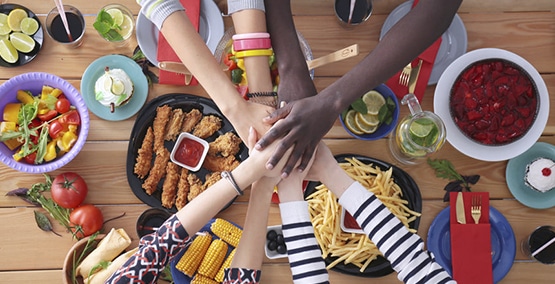
What can I eat while breastfeeding?
Fortunately, there are very few restrictions on food choices once you start breastfeeding. Usually, breastfed infants are not affected by the food choices of their mother. However, most of the nutrients and compounds in your diet is passed onto your child through breast milk. As a result, if your baby has allergies or food sensitivities, then you may have to adjust your eating habits to help your baby feel better after feedings.
How Your Baby Reacts Determines What You Should Eat
It can be hard to know whether certain foods in your diet affect your baby. That's because it can take up to 24 hours for the baby to react to what's coming through your breast milk. If your baby becomes fussy, gassy, irritable, develops a rash, vomits, or has a change in behavior then their bodies may not be agreeing with a food you are eating.
The best way to tell is by keeping track of when the baby's fussy, getting a rash or vomiting and what you ate. If you notice that your baby is unusually fussy after a feeding where you ate onions, he or she may have a sensitivity to the onions, the spices or the oil you cooked them in, because they can all pass through your breast milk. You can try to reduce or eliminate onions you eat before the next feeding to see if that improves your baby's digestion.
Common Food Problems
Some foods are known to cause problems for sensitive babies, especially gassy foods, dairy, and caffeine.
Gassy foods include vegetables such as
- cabbage, cauliflower, cucumbers, Brussel sprouts, broccoli,
- onions, garlic, mushrooms,
- spices
- carbonated or fizzy drinks.
If you drink a lot of milk, this can cause upsets in your infant's digestion. Caffeine can also irritate your baby (especially if you drink more than 2-3 cups of coffee).
If you suspect that your baby may be sensitive to something in your diet, eliminating some of these foods first may help you discover the problem food quickly. If you have eliminated these problem foods and your baby is still having problems, you may need to consider other foods you eat daily that may be affecting your baby's behavior, or that food may not be the cause. <<colic above>>

Is it the Food, or Another Problem?
Staple foods in your diet, can disagree with your baby's digestion
- eggs,
- wheat,
- soy,
- sugary foods and drinks,
- or fatty foods
Make sure to keep track of the foods your eating as well as your baby's reaction after the following feeding. Eventually, you will find a pattern of the foods that may make your baby a little fussy. If you continue to experiment with removing certain foods from the diet and your baby still does not improve, talk to your doctor about your baby's symptoms.




